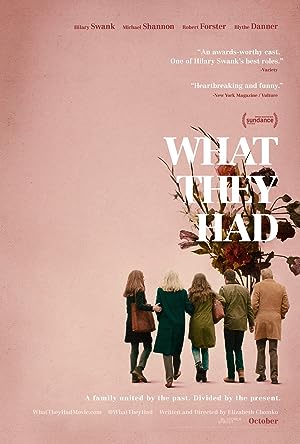What They Had is a movie about a family struggling with the best resolution to the matriarch’s struggle with Alzheimer’s and how that decision affects their individual lives and relationships with each other. It stars Hillary Swank with a supporting ensemble cast, which includes Michael Shannon, Robert Forster, Blythe Danner and Taissa Farmiga, Vera’s little sister. It is also Elizabeth Chomko’s directorial and writing debut.
I was going to see What They Had in theaters, but it was only out for a week then whisked away as if it was one of the worst movies in 2018, when it was not even a contender for that title. Boundaries, which was also not one of the worst movies in 2018, but a strong competitor for the title, was in theaters for two weeks. Come on! I’m grateful when theaters protect me from myself, but the cast was too strong, and the actual movie, though flawed, definitely did not deserve that kind of treatment. I thought it was a mostly engaging, surprisingly funny and fairly realistic depiction of a family dealing with a crisis. I know that I have enjoyed a movie if I find myself writing down quotes. “What are you, dead inside?” “Almost.” Yes!
What They Had nailed the difficulty that adult children have in dealing with adult parents who are either incapable or unwilling to make the best decision about their future yet being responsible for their well being without having the tools to do so. The movie does not really pick a side and entertains the idea that each character is possibly right: the person resistant to change, the person who sees the need for change and the compromiser. I do think that for complete accuracy, we needed a person who demonizes the second person, preferably on the phone or online and is never present, i.e. the invisible backseat driver, for complete accuracy, but the movie tries to keep things light while dealing with life and death issues. I think the movie generally succeeds, and I was invested in this story line, which explains why I was most invested in the son’s storyline, not the daughter’s, and I loved that he was most similar to his mother in terms of temperament. I also liked that we had images of men as caretakers.
While the beginning of What They Had was visually evocative and memorable, to balance out the end of the movie, which shows life after the crisis, I think that it should have began with establishing what normal life looked life for each character instead of starting with the crisis. I also thought that the son’s life was more interesting than the daughter’s, and perhaps he should have been the lead character or at least make it more of an ensemble piece with the crisis as the catalyst instead of choosing one lead character. The daughter’s life felt like it detracted too much from the crisis and the other characters without being a satisfying substitute.
The driving force of What They Had may be about this crisis awakening the daughter to the need for a richer emotional life, but as we watch her fumble towards what that looks like, I honestly thought of it as a typical midlife crisis as opposed to an assertion of her genuine self. I thought that her awkward, regressive behavior was a perfect image of her character, but it would not enable her to have the depicted happy ending. She is busy trying to lay the blame for her dissatisfaction with her life at the men’s feet, but when she finally confronts her father, and we later see her husband, we realize that she actually got what she wanted and was not initially pushed into it, but has never been fully honest with herself or others about who she is and what she wants. She clings to images of what she should be doing to find happiness, and if one of those images is having an affair, so be it. Her problem is that she doesn’t know who she is still or what she wants so she can’t have a happy ending because she is still on a journey, which leads to a vague unease about the movie that could have been avoided if her character was not centralized. Because she defines herself in relation to others, the ending actually troubled me. She simply pushed the deadline back to when she has to be alone with herself and decides if she likes herself.
What They Had also felt unbalanced because I believe that the movie references two granddaughters, but we only meet one. If I’m correct, I need a photo of the second and a line about why she doesn’t appear in the movie; don’t reference two granddaughters or don’t show me any granddaughters. I kept waiting for the other shoe to drop, and it never does, which left me with more questions. It also felt strange not to know what the featured granddaughter was doing after the crisis considering how much time we spent with her during the crisis. Maybe I missed something crucial, but if I didn’t, I thought another reader or editor should have caught this off kilter feeling.
All of my criticisms of What They Had are with the story structure, not the actors who brought the characters to life and had great chemistry. It is far too incisive to be dismissed as a slightly elevated television movie. With a few more revisions, it would have been perfect, and I look forward to Chomko’s next movie. If you are a fan of anyone in the cast or interested in the plot, I would definitely encourage you to see it.
Stay In The Know
Join my mailing list to get updates about recent reviews, upcoming speaking engagements, and film news.





